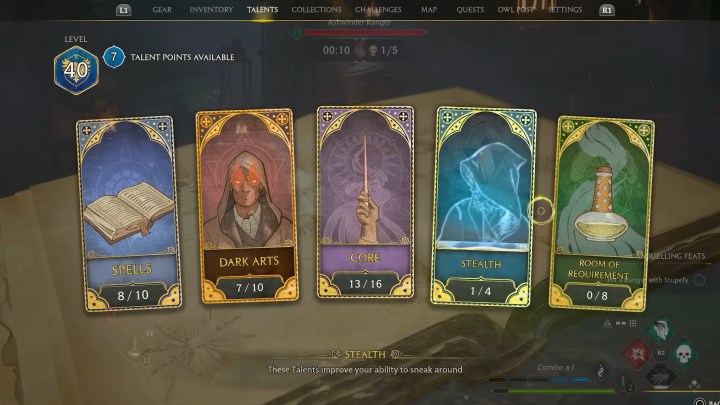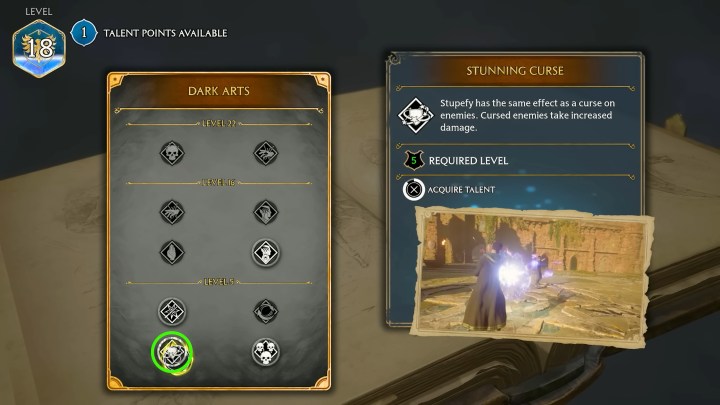As you would expect from a witch or wizard still going through school in Hogwarts Legacy, your created character still has a lot to learn in the wizarding world. Thankfully you don’t have to go to class in order to expand your arsenal of magical abilities thanks to the Talent system. Talents may as well just be called skills since they function just like skills do in any other RPG.
However, Hogwarts Legacy is the kind of RPG that packs tons of Talents into it, forcing you to pick and choose which ones you want to invest your precious points into. While some will depend on what type of witch or wizard you want to play as (so don’t forget to consider the best traits as well), there are a few that stand above the rest regardless of how you like to play. Here are 10 of the best Talents in Hogwarts Legacy.
How to get Talents

First, you won’t gain access to your Talent screen until you beat the very early quest called “Jackdaw’s Rest,” and then you won’t begin to accumulate any Talent Points until level 5 and onward. Hogwarts Legacy has a level cap of 40, meaning that you can earn a maximum of 35 Talent Points. Since there are a total of 48 Talents, you won’t be able to get them all on a single character. There is also no way to refund Talent Points once used, so make sure you spend them wisely.
The easiest part about Talents, at least in terms of understanding them, is how you earn them. You gain a Talent Point for every level you gain in Hogwarts Legacy, which of course comes by earning XP. XP, naturally, will be accrued by completing main quests, side quests, various activities, and defeating enemies.
Talents are broken up into five categories, each with its own dedicated Talents to unlock. However, somewhat like a skill tree, you can’t pick and choose any skill from any category right off the bat. Each tree is segmented into tier 1, tier 2, and tier 3 talents. Tier 1 talents are unlocked right away at level 5, with tier 2 becoming available only when you reach level 16, and the final set of skills opening up at level 22.
The five Talent categories are:
- Spells (10 skills) – These skills improve your spells.
- Dark Arts (10 skills) – These talents will improve your Dark Art abilities.
- Core (16 skills) – Core Talents are general buffs.
- Stealth (4 skills) – This category improves your sneaking abilities.
- Room of Requirement (8 skills) – This section focuses on improving the effectiveness of potions and plants.
Best Talents to get

Here are 10 of the best Talents you can get in Hogwarts Legacy for all playstyles, what they do, and what is required to learn them.
- Accio Mastery (tier 1): Must know Accio. Enemies near a target summoned by Accio are also pulled to you.
- Confringo Mastery (tier 1): Must know Confringo. Confringo impacts produce fiery bolts that seek enemy targets.
- Glacius Mastery (tier 2): Must know Glacius. Striking an enemy frozen by Glacius blast damaging shards outward from the target.
- Stunning Curse (tier 1): Must know Stupefy. Stupefy has the same effect as a curse on enemies. Cursed enemies take increased damage.
- Revelio Mastery (tier 2): Must know Revelio. Increases the range of Revelio.
- Thunderbrew Potency (tier 3): Must be able to use Thunderberws. The range and damage of the potion effect are greatly increased.
- Petrificus Totalus Mastery (tier 3): Must know Petrificus Totalus. Petrificus Totalus emanates an area of effect that can impact nearby enemies.
- Avada Kedavra Mastery (tier 2): Must know Avada Kedavra. Killing an enemy with Avada Kedavra kills all cursed enemies.
- Maxima Potion Potency (tier 2): Must be able to use Maxima Potions. Maxima Potion causes attacks to have additional increased damage and break enemy shields.
- Human Demiguise (tier 1): Must know Disillusionment. Allows you to Sprint while using Disillusionment.



